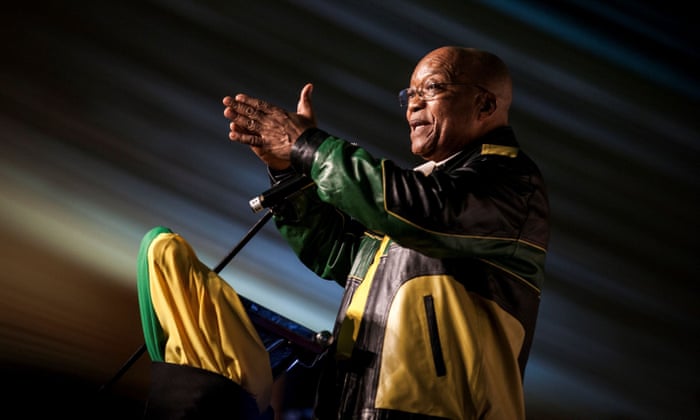Secret ballot for vote on motion of no confidence in South Africa's Zuma
 Jacob Zuma, who came to power in 2009, has been implicated in several corruption scandals. Photograph: John Wessels/AFP/Getty Images
Jacob Zuma, who came to power in 2009, has been implicated in several corruption scandals. Photograph: John Wessels/AFP/Getty Images
 Jacob Zuma, who came to power in 2009, has been implicated in several corruption scandals. Photograph: John Wessels/AFP/Getty Images
Jacob Zuma, who came to power in 2009, has been implicated in several corruption scandals. Photograph: John Wessels/AFP/Getty Images
Decision on Tuesday over whether to oust longstanding president seen as test of unity for African National Congress party
A vote on a no-confidence motion that could oust Jacob Zuma is to be held as a secret ballot, increasing the chances that South Africa’s president since 2009 is poised to lose office.
Baleka Mbete, the parliamentary speaker and national chair of the ruling African National Congress, told reporters on Monday the surprise decision had been made “to ensure the outcome of this very important vote is credible”.
Zuma, who has been hit by repeated scandals and a flagging economy, has survived five previous no-confidence votes but none have been held in secret.
About 20 senior ANC lawmakers have signalled they will vote with the opposition for its motion in the 400-seat parliament, but dozens more would need to disobey direct orders from senior party officials for Zuma to be forced from power.
Zuma, 75, is due to step down as head of the ANC in December, and will not therefore lead the party into the 2019 general election, whatever the result of Tuesday’s vote.
The ANC has historically sought to make major decisions at a time of its choosing, and has closed ranks against external pressure. The party led the struggle against the apartheid regime and has ruled South Africa since the first free elections 23 years ago.
Jackson Mthembu, the party’s chief whip, said ousting Zuma would “have disastrous consequences that can only have a negative impact on the people of South Africa”.
However the ANC is deeply fractured, with an increasingly vocal faction seeking root-and-branch reform, and some of its lawmakers are likely to vote with the opposition motion.
A group of ANC veterans from the anti-apartheid movement recently called for MPs to vote against Zuma, who was himself imprisoned with Nelson Mandela on Robben Island under white-minority rule.
South Africa is “witness to larceny on a grand scale, leaving the country not only impoverished, but also increasingly in the hands of criminalised and compromised governance,” the veterans said in a statement.
Public support for the ANC slipped to its lowest ever level – 55% – in last year’s local elections. Many ANC supporters were shaken by a cabinet reshuffle in March when the much-respected finance minister was replaced with a Zuma loyalist.
The opposition, principally composed of the Democratic Alliance and Julius Malema’s Economic Freedom Fighters (EFF), will need about 50 ANC defectors for the no-confidence motion to pass.
The DA said the vote was “an opportunity for us all to stand up to corruption and get rid of President Zuma and his cabinet”.
Street demonstrations in favour of the motion are planned in Cape Town, an opposition stronghold.
A petition signed by more than a million people demanding Zuma’s removal has been presented to Cyril Ramaphosa, the deputy president. Ramaphosa, who is seen as the leader of the party’s reformist faction, is a candidate in forthcoming ANC elections and a presidential hopeful.
His main challenger is former foreign minister and Zuma’s ex-wife, Nkosazana Dlamini-Zuma, who has significant support within the party hierarchy, among rank and file, as well as in crucial provinces.
Much of the criticism of Zuma has been prompted by his alleged relationship with the wealthy Gupta business family. For more than a year South African media have reported a string of allegations of improper influence and graft. Both Zuma and the Guptas deny any wrongdoing.
The political instability comes against a background of economic stagnation, with high levels of unemployment and sharpening resentment at South Africa’s deep, enduring inequality.

